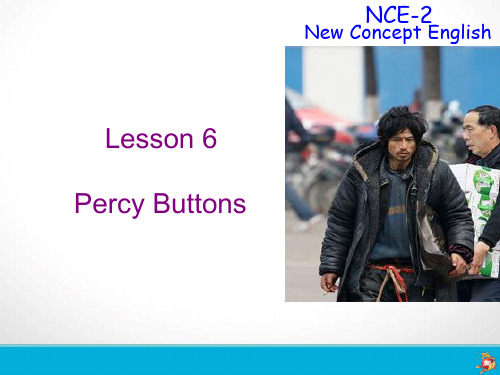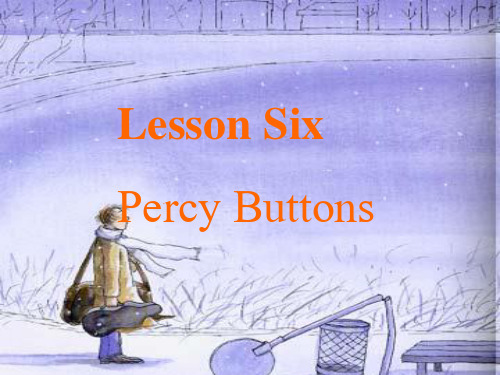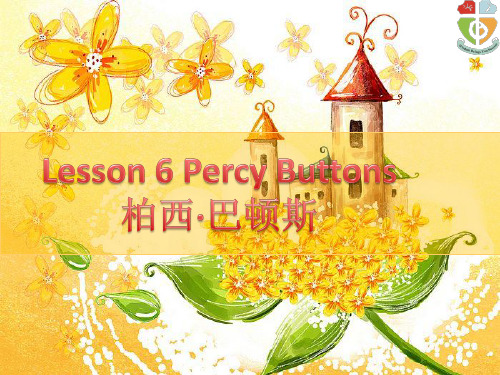NCE2 新概念二Lesson 6课件(共51张PPT)
合集下载
新概念2第6课ppt课件

three times a month
four times a month
every two month
every three month
不规则动词的过去式
• begin—began—begun drink—drank—drunk sing— sang—sung ring—rang—rung swim—swam—swum
• eat-ate-eaten • stand-stood-stood • give-gave-given • tell-told-told
• 有些动词的后面加上介词或副词以后就会 改变词义。这种新的组合称作短语动词。
• 如:put:放 put on:穿 take:拿走 take off:脱下 look:看 look at:看;look for:寻找;
call at+地点=visit someplace
call on sbபைடு நூலகம்
I will call on you.=I will call at your home.
• 1) close call 有两个意思: 1) something dangerous almost happened 差点 出了事
• beggar n.乞丐 beg v.乞求
beg for:乞求得到 ask for:请求得到 • (l )beg your pardon?对不起,请原谅。 (常用于没听清,请求对方再说一遍。)
Don't always ask others for help. 别总向他人求助。 He never asks his parents for money. 他从来不向父母要钱。
• This is a story about four people named Everybody, Somebody, Anybody, and Nobody. There was an important job to be done and Everybody was asked to do it. Everybody was sure somebody would do it. Anybody could have done it ,but Nobody did it. Somebody got angry about that, because it was Everybody's job. Everybody thought Anybody could do it but Nobody realized that Everybody wouldn't do it.
four times a month
every two month
every three month
不规则动词的过去式
• begin—began—begun drink—drank—drunk sing— sang—sung ring—rang—rung swim—swam—swum
• eat-ate-eaten • stand-stood-stood • give-gave-given • tell-told-told
• 有些动词的后面加上介词或副词以后就会 改变词义。这种新的组合称作短语动词。
• 如:put:放 put on:穿 take:拿走 take off:脱下 look:看 look at:看;look for:寻找;
call at+地点=visit someplace
call on sbபைடு நூலகம்
I will call on you.=I will call at your home.
• 1) close call 有两个意思: 1) something dangerous almost happened 差点 出了事
• beggar n.乞丐 beg v.乞求
beg for:乞求得到 ask for:请求得到 • (l )beg your pardon?对不起,请原谅。 (常用于没听清,请求对方再说一遍。)
Don't always ask others for help. 别总向他人求助。 He never asks his parents for money. 他从来不向父母要钱。
• This is a story about four people named Everybody, Somebody, Anybody, and Nobody. There was an important job to be done and Everybody was asked to do it. Everybody was sure somebody would do it. Anybody could have done it ,but Nobody did it. Somebody got angry about that, because it was Everybody's job. Everybody thought Anybody could do it but Nobody realized that Everybody wouldn't do it.
新概念2-第6课-Lesson6-课件-PPT

Language points
5. Later a neighbour told me about him.
介词about可以和一些动词连 用,“关于……(的)”、“涉 及……(的)”: tell sb. about sth. 告诉某人关于 某人的事
He spoke to me about his dog.
Have you ever seen a beggar singing while he is standing on his head?
New words
What does he do?
beggar n.乞丐
beg v.乞求
e.g. I beg your pardon? 请你原谅 beg for 乞求得到 ask for 请求得到 askoneshead倒立standoneshands用手着地hand单数就是一只手双手复数standonesknees跪着膝盖lieonesback仰面躺着lieonessideonesstomach趴着形体分析方法是贯穿于一切工程图绘制阅读及尺寸标注全过程的基本思维方法目的就是为了便于准确地理解组合体的形状及结构
Language points
3.He asked me for a meal and a glass of beer. ask (sb.) for sth =request for sth. 问某人要什么东西 (for为了这个目的去请求某人, sb.更多的时候不出现, ask for sth.) The boy asked (his parents)for money again.
Practice
• I.改错题。 • 1.Jack has moved to . Rucy will move in the day after tomorrow.
新概念英语第二册lesson6 ppt课件

• He begged money from people passing by.
新概念英语第二册lesson6
• (2)向某人要,要求某物 • 我的弟弟每年都向我要押岁钱。 • My little brother begs me for lucky money every
year. • 那个小女孩向妈妈要了一条漂亮的裙子 • The girl begged her mother for that beautiful skirt.
Lesson Six Percy Buttons
新概念英语第二册lesson6
今 日 格言
While there is life there is hope. 留得青山在,不怕没柴烧。
新概念英语第二册lesson6
精品资料
1.损坏,使索然无味 2. 公共的
3. 友好的 4. 越过 5. 整个的
6. 唯一的,单一的 7. 令人兴奋的
8. 接受,收到
9. 公司,商行
10. 不同的 11. 服务 12. 在国外
13. 私人的 14.忍受 15.注意
16.参观博物馆17. 教我几句意大利语
18. 借你一本书 19. 作出了一个重大决定
20. 在乐山的中心 21. 许多地方
22. 我哥哥待在澳大利亚有六个月了。
Bridge Street?
新概念英语第二册lesson6
Read and answer
• I have just moved to a house in Bridge Street. Yesterday a beggar knocked at my door. He asked me for a meal and a glass of beer. In return for this, the beggar stood on his head and sang songs. I gave him a meal. He ate the food and drank the beer. Then he put a piece of cheese in his pocket and went away. Later a neighbour told me about him. Everybody knows him. His name is Percy Buttons. He calls at every house in the street once a month and always asks for a meal and a glass of beer.
新概念英语第二册lesson6
• (2)向某人要,要求某物 • 我的弟弟每年都向我要押岁钱。 • My little brother begs me for lucky money every
year. • 那个小女孩向妈妈要了一条漂亮的裙子 • The girl begged her mother for that beautiful skirt.
Lesson Six Percy Buttons
新概念英语第二册lesson6
今 日 格言
While there is life there is hope. 留得青山在,不怕没柴烧。
新概念英语第二册lesson6
精品资料
1.损坏,使索然无味 2. 公共的
3. 友好的 4. 越过 5. 整个的
6. 唯一的,单一的 7. 令人兴奋的
8. 接受,收到
9. 公司,商行
10. 不同的 11. 服务 12. 在国外
13. 私人的 14.忍受 15.注意
16.参观博物馆17. 教我几句意大利语
18. 借你一本书 19. 作出了一个重大决定
20. 在乐山的中心 21. 许多地方
22. 我哥哥待在澳大利亚有六个月了。
Bridge Street?
新概念英语第二册lesson6
Read and answer
• I have just moved to a house in Bridge Street. Yesterday a beggar knocked at my door. He asked me for a meal and a glass of beer. In return for this, the beggar stood on his head and sang songs. I gave him a meal. He ate the food and drank the beer. Then he put a piece of cheese in his pocket and went away. Later a neighbour told me about him. Everybody knows him. His name is Percy Buttons. He calls at every house in the street once a month and always asks for a meal and a glass of beer.
新概念英语第二册-lesson-6培训课件

桌上的东西。 Jim was knocked over by a bus this morning. 今天
上午吉姆被一辆公共汽车撞倒了。 She has knocked a cup over again. 她又碰倒了一个
杯子。
③ vt. 把(某人)打成……状态 He knocked Tom out yesterday. 他昨天把汤姆打
新概念英语第二册-lesson-6
★beggar n. 乞丐(bum)
Who is a beggar ? A beggar is someone who lives by asking for
money and food. 描述一种人的特征: A person is someone who ....
★knock
① vi. 敲门 I knocked, but no one answered. knock at 敲(门、窗等) knock at the door;knock at the window ② vt.&vi. 碰撞 You always knock things off the table. 你总是碰掉
Ask for the moon 异想天开 (cry for the moon)
Food n. 食物 ➢ Man cannot live without food and water.
海鲜,叫seafood, ➢绿色食品green food ➢ 吃快餐,叫fastfood, ➢ 垃圾食品:junk food但更正源自的场合,人们把 beggars 叫作
homeless.
It is a beggar’s pride that he is not a thief. 乞 丐自豪的地方是:他们没有做小偷
上午吉姆被一辆公共汽车撞倒了。 She has knocked a cup over again. 她又碰倒了一个
杯子。
③ vt. 把(某人)打成……状态 He knocked Tom out yesterday. 他昨天把汤姆打
新概念英语第二册-lesson-6
★beggar n. 乞丐(bum)
Who is a beggar ? A beggar is someone who lives by asking for
money and food. 描述一种人的特征: A person is someone who ....
★knock
① vi. 敲门 I knocked, but no one answered. knock at 敲(门、窗等) knock at the door;knock at the window ② vt.&vi. 碰撞 You always knock things off the table. 你总是碰掉
Ask for the moon 异想天开 (cry for the moon)
Food n. 食物 ➢ Man cannot live without food and water.
海鲜,叫seafood, ➢绿色食品green food ➢ 吃快餐,叫fastfood, ➢ 垃圾食品:junk food但更正源自的场合,人们把 beggars 叫作
homeless.
It is a beggar’s pride that he is not a thief. 乞 丐自豪的地方是:他们没有做小偷
新概念英语第二册Lesson 6课件

look at walk into
2023/6/1
knock的短语动词
2023/6/1
v. 敲,击,碰,撞 撞掉,撞落
下班
打折
撞翻,撞倒
打晕
打斗
拳击手 out
over
花盆
off
at
2023/6/1
烛台
失去知觉
The old lady knocked the thief out with a candlestick.
2023/6/1
Let’s call on John. call on sb.拜访某人 I called at your house yesterday. call at sp.拜访某地 You can call me tomorrow. 打电话 Somebody is calling over there. 喊,叫 I call my son Roby. 给…命名,称呼
2023/6/1
拜访 相当于visit 加地点
每个月一次 频率 提问用how often
要求…
2023/6/1
付款 be new to…对…不熟悉
2023/6/1
不能直接加从句
不能直接加人
直接加人 直接加从句
2023/6/1
多长时间
多少时间以后
一点 喊叫
街道
2023/6/1
块 请,叫,打电话 方式,道路
ask sb. for sth. 向某人要某物 ask him for some food
2023/6/1
作为对…的回报 stand的过去式 用(某种方式)
stand on one’s hands 用手倒立 stand on one’s knees 跪 lie on one’s back 平躺 lie on one’s side 侧躺
新概念英语第二册第六课精品课件

last month. In return (for it), I'll
show you some picture books. 你上个月把这本有趣的书借给
了我。作为报答,我将给你看 一些画册。
stand on one’s head 倒立
9
Further notes on the text
• I gave him a meal. He ate the food and drank the beer. Then he put a piece of cheese in his pocket and went away. Later a neighbour told me about him.
不定冠词a/an
第一次提到的某人或某物,非特 指时:
He is a doctor. He is studying in an institute.
在单数普通名词前指一类人或事 物时:
An ear is an organ for listening. 耳 朵是听觉器官。
A fox is a cunning animal. =Foxes are cunning animals. =The fox is a cunning animal.
• once a month, 每月一次 • once表示频率时后面直接加表示时间的名词: • Jane wrote to her parents once a week. • 简每星期给父母写封信。 • 他每年回两次南方。 • He goes back to the South twice a year.
Special Difficulties
put词组 • Don't put the cup on the table! • 别把杯子放在桌上!
show you some picture books. 你上个月把这本有趣的书借给
了我。作为报答,我将给你看 一些画册。
stand on one’s head 倒立
9
Further notes on the text
• I gave him a meal. He ate the food and drank the beer. Then he put a piece of cheese in his pocket and went away. Later a neighbour told me about him.
不定冠词a/an
第一次提到的某人或某物,非特 指时:
He is a doctor. He is studying in an institute.
在单数普通名词前指一类人或事 物时:
An ear is an organ for listening. 耳 朵是听觉器官。
A fox is a cunning animal. =Foxes are cunning animals. =The fox is a cunning animal.
• once a month, 每月一次 • once表示频率时后面直接加表示时间的名词: • Jane wrote to her parents once a week. • 简每星期给父母写封信。 • 他每年回两次南方。 • He goes back to the South twice a year.
Special Difficulties
put词组 • Don't put the cup on the table! • 别把杯子放在桌上!
新概念英语NCE2_Lesson06课件

Lesson 6
Percy Buttons
Questions
1. Who knocked the writer's door yesterday? 2. What did this man ask for? 3. What did he do to thank the wriPHRASES
Page 11
That's all !
1、书籍是朋友,虽然没有热情,但是非常忠实。2022年3月24日星期四2022/3/242022/3/242022/3/24 2、科学的灵感,决不是坐等可以等来的。如果说,科学上的发现有什么偶然的机遇的话,那么这种‘偶然的机遇’只能给那些学有素养的人,给那些善于独
过去了。 ④ 与off连用时有一些特殊含义,一般用于口语
vt. (价格上)减去,除去,打折扣 eg. They knocked five dollars off the price of the coat.
vi. 下班,停止,中断(工作等) eg. When do you usually knock off? 你一般什么时候下班
1. begger n. 乞丐;(口)家伙 eg. Let beggers match with beggers. (谚)
You lucky begger!
beg
v. 乞求,乞讨;恳求
beg sth. from sb. 从某人那里乞求
beg sb. (not) to do sth. 恳求做/不做某事
visit表示正式的访问,也可表示朋友间的拜访,时间可长可 短
eg. Yesterday, I paid him a visit.
see作为访问总是用于非正式的而且是熟人间的拜访
Percy Buttons
Questions
1. Who knocked the writer's door yesterday? 2. What did this man ask for? 3. What did he do to thank the wriPHRASES
Page 11
That's all !
1、书籍是朋友,虽然没有热情,但是非常忠实。2022年3月24日星期四2022/3/242022/3/242022/3/24 2、科学的灵感,决不是坐等可以等来的。如果说,科学上的发现有什么偶然的机遇的话,那么这种‘偶然的机遇’只能给那些学有素养的人,给那些善于独
过去了。 ④ 与off连用时有一些特殊含义,一般用于口语
vt. (价格上)减去,除去,打折扣 eg. They knocked five dollars off the price of the coat.
vi. 下班,停止,中断(工作等) eg. When do you usually knock off? 你一般什么时候下班
1. begger n. 乞丐;(口)家伙 eg. Let beggers match with beggers. (谚)
You lucky begger!
beg
v. 乞求,乞讨;恳求
beg sth. from sb. 从某人那里乞求
beg sb. (not) to do sth. 恳求做/不做某事
visit表示正式的访问,也可表示朋友间的拜访,时间可长可 短
eg. Yesterday, I paid him a visit.
see作为访问总是用于非正式的而且是熟人间的拜访
新概念英语第二册第6课课件

• I have just moved to a house in Bridge Street.
moved to --- 搬去某地 moved
into out of away
• Yesterday a beggar knocked at my door. P34 • He asked me for a meal and a glass of beer.
P3d me about him.
tell about ask about
• Everybody knows him. His name is Percy Buttons. • He calls at every house in the street once a month and always asks for a meal and a glass of beer.
call on = visit 拜访 for = need 需要 off = cancel 取消
call at --- 光顾、停驻
go
in
ask away on
take
call look
into
out of
for get
at off fly
up turn after give put send
made
ask sb. for sth. --- 向某人所要某物 ask sb. to do sth. --- ?
• In return for this, the beggar stood on his head and sang songs. 作为报答 用…站立
• I gave him a meal. He ate the food and drank the beer. Then he put a piece of cheese in his pocket and went away.
moved to --- 搬去某地 moved
into out of away
• Yesterday a beggar knocked at my door. P34 • He asked me for a meal and a glass of beer.
P3d me about him.
tell about ask about
• Everybody knows him. His name is Percy Buttons. • He calls at every house in the street once a month and always asks for a meal and a glass of beer.
call on = visit 拜访 for = need 需要 off = cancel 取消
call at --- 光顾、停驻
go
in
ask away on
take
call look
into
out of
for get
at off fly
up turn after give put send
made
ask sb. for sth. --- 向某人所要某物 ask sb. to do sth. --- ?
• In return for this, the beggar stood on his head and sang songs. 作为报答 用…站立
• I gave him a meal. He ate the food and drank the beer. Then he put a piece of cheese in his pocket and went away.
- 1、下载文档前请自行甄别文档内容的完整性,平台不提供额外的编辑、内容补充、找答案等附加服务。
- 2、"仅部分预览"的文档,不可在线预览部分如存在完整性等问题,可反馈申请退款(可完整预览的文档不适用该条件!)。
- 3、如文档侵犯您的权益,请联系客服反馈,我们会尽快为您处理(人工客服工作时间:9:00-18:30)。
零冠词
1.在一日三餐、姓名、地名、国名 (非复合词)、西方节日前以及月份、 星期等前面。
零冠词
2.当bed, church, college, court, hospital, prison, school, sea, work 等n.指有关活动时。
Eg: go to school 去上学 go to the school 去学校(办公) ……
A story
Last Sunday, my dad bought me ……
But…
small
So my mum bought me……
Now……
And I can use…to draw many pictures.
My teacher likes……very much.
1. -Did you see my grandmother? ?
4. 表示世界上独一无二的东西 Eg:the sun
the moon the earth ……
When should we use “the”?
5. 在上下文中再次提到
Eg:Mr. Sawyer just bought a new house. The house is in the west street.
-Oh, I saw ______old woman sitting on a chair by the lake. Maybe she is.
A. a
B. an
C. the D. ×
play the guitar play the violin ……
When should we use “the”?
3.在特指的海洋、河流、山脉以及部 分复合词形式的国名前
Eg:the Pacific the Yellow River the United States ……
When should we use “the”?
food n.食物
f d
oo
foods 一类食物
Eg: sweet foods 甜食
I like all kinds of foods, vegetables, fruits.
Pocket(n.)
[ɔ]
Call (v.) [ɔ:]
1. Please call me when you get home.
When should we use a/an? 1. 泛指“一个”,后接名 词单数。
I have a computer. a pen ……
What do you have?
பைடு நூலகம்
When should we use a/an?
2. 用在表示职业、社会地位、宗教、 民族一类的名词前表示一类人。
Eg: An engineer’s job is very important in a tech company.
Read these sentences:
I have a book./I have some books. There is a bed in my room./…some beds. I bought a book last Sunday. And yesterday, I lent the book to Linda. I had a very lovely dog and my family loved it very much. But last Sunday, the dog bit my little sister.
NCE2 Lesson6 Percy Buttons
Discuss:
• Have you ever seen a beggar before?
• How did you feel when you saw a beggar?
• Did you give some money or other things to a beggar?
Lesson Schedule:
• New words and expressions • Grammar • Text & Key points
beggar (n.)
be ggar
[e]
beggar v. beg beg for sth.
The blind man begged for a living.
When should we use “the”?
1. 特指一个(这个) Eg:open the window
close the door please pass me the books ……
When should we use “the”?
2. 用于乐器前 Eg:play the piano
A German can always speak more than two languages.
When should we use a/an?
3. 用于动词词组中
Eg:(疾病)
have a cold
have a headache
have a toothache
have a stomach ache
2. 拜访,光顾 call at + 地点
call at the shop
call on + sb.
He calls on his brother every week.
Lesson Schedule:
• New words and expressions • Grammar • Text & Key points
3.
……
Eg: (其他) have a look have a try take a bath ……
Read these sentences:
I have a book./I have some books. There is a bed in my room./…some beds. I bought a book last Sunday. And yester day, I lent the book to Linda. I had a very lovely dog and my family loved it very much. But last Sunday, the dog bit my little sister.
